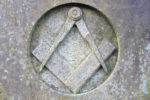Mention ancient Greece, and you will get instant understanding. From the Gods and Goddesses of Olympus including Aphrodite, the Greek goddess of love to the ancient seafarers, and the events that made it so memorable and enjoyable to read about. Ancient Greece was considered the birthplace of modern civilization. Ruins of Ancient Greece can be seen such as the Parthenon, the Circus Maximus and other ruins that still fire imaginations yet today. Ancient Greece also gave the world Philosophy. If you wish to learn more about Ancient Greece, take a look at some interesting facts listed below.
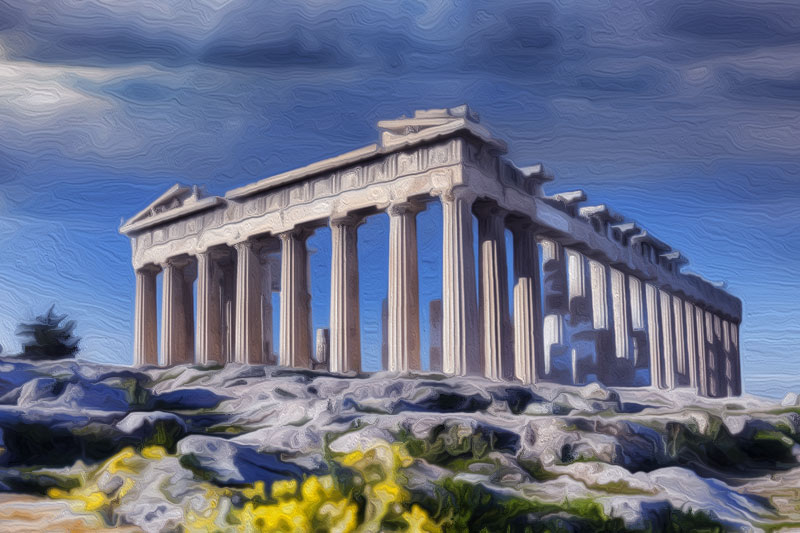
Pytheas and the Tides
Pytheas was the first Greek not only to observe the ocean tides; he was also the first to give the correct explanation for their rise and fall. It took until Isaac Newton to make the explanation of how the tides worked and what part the Moon had in their movement. Pytheas was over 2,000 years ahead of his time.
Flat Earth and Anaximander
Anaximander realized around 560 B.C. that the earth had a cylindrical shape. The concept was so free of paradox and so satisfying that it was accepted without proof by scholars. Eighteen centuries later, Ferdinand Magellan’s expedition circled the globe and proved that the earth was round.
Aristarchus and Astronomy
This Greek scientist believed that all the heavenly bodies’ motions could be understood. It would be assumed that all planets revolved around the sun. The stars were far away because they seemed not to move. Copernicus knew of these views and made mention of them in his book De Revolutionibus Orbium Coelestium.
Hypatia and the Library of Alexandria
She is the last noted member of the famed Library of Alexandria and the only noted woman scholar in antiquity. Neoplatonism was her teaching subject, and she also demonstrated Euclid’s ideas. While she had Christian students, her end came at the hands of Bishop Cyril who murdered her in 415. The library itself was destroyed in 391 AD under the auspices of Archbishop Theophilus. The library was burned to the ground, and all texts were destroyed under his command. This ended the repository of the greatest minds and teachers in the Ancient world at that time.
Democracy in Ancient Greece
Democracy originated from the Greek word Demokratia meaning power by the people and is described as such because it is the influence of a large population of people not just a select few. It was invented in Athens in the late 500s B.C.
Political speeches of Demosthenes in the mid 300s B.C and Aristophanes in the late 400s B.C. were documented and provide great insight into the beginning of Democracy, but the greatest source of information can be derived from Aristotle’s Consitution of Athens which actually details the different branches of government.
The ancient Greek language
The ancient Greek language was not just one language but many. There were three main ancient Greek dialects. Doric dialect spoken by the Dorian Greeks, Ionic dialect, spoken by the Ionians and the Attic dialect spoken by those in Athens. Very ancient Greek was spoken by the Mycenaeans in 2100 B.C.
Ancient Greece Education
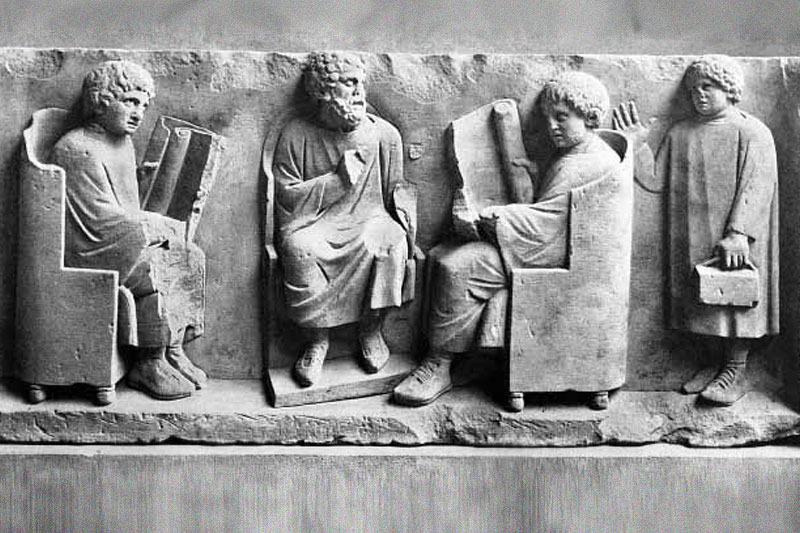
175 years after the Greeks developed the Phoenician alphabet in approximately 800 B.C., majority of males in the more educated Greek states could both read and write. The earliest records found to refer to some type of schooling pinpoint the year as 494 B.C. and the site as the Greek island of Chios and less than 10 years later art depicting school classes began to appear on vases.
The Olympics in Ancient Greece
The Olympics were first held in 776 B.C. They were held at the sanctuary of the gods at Olympia. Named after the moutain of the gods, Mt Olympus, the Olympics were held every four years in honor of the god of all gods, Zeus, and were open to all free born Greek men.
In the early days of the Olympics, all the contests were held on the one day and consisted of two events only. Wrestling and a foot race, which was one lap of the stadium. By the late 400 B.C’s, the games were expanded to five days and covered such events as boxing, wrestling, foot race in armor, pentathlon and an event for the ladies, a foot race.
The prize for winning the Olympics games was nothing more then a bunch of olive leaves.
The games lost importance when the Romans took control of Greece and were finally banished when the emperor of Byzantine, Theodosius I, banned all pagan rituals.
Ancient Greece Gods
Zeus

Zeus was the king of the gods, spiritual father of gods and men, as dispenser of divine justice in the universe according to Greek religion and myth. Zeus, unlike many of the Greek gods was a sole Greek concept. Writings about Zeus date back to 1400 B.C, but would more then likely have been worshipped much longer then that. Zeus started off as the god of weather, which would be why the Greeks and now Western society depict him with a thunder bolt in his hand.
Dionysus
Dionysus appeared in greek religion around 1200 B.C. and was worshipped as the greek god of vegetation, wine and religious possession. The story of his creation is that he was the son of Zeus and the Theban Princess Semele, while pregnant with Dionysus, Zeus’s jealous wife Hera convinced Semele to ask Zeus to appear to her in his original form. Zeus obliged and struck as a thunderbolt, mortally wounding Semele but giving immortality to her unborn son. Dionysus eventually rose to take place as the 12th God on Mt Olympus.
Apollo
Apollo’s attributes made him the classical Greek ideal. He was aslo a lord of dance, poetry, music, medicine, shepherding, intellectual inquiry and colonization. Apollo offered ritual purification for those who had commited murder and other impieties. Apollo could reveal the future and the will of his father through his various human oracles.
Every four years the important Pythian games were held in Apollos’ temple and oracle at Delphi, which was the the most influential religious centre in Greece. The two famous precepts carved on the Delphi temple wall “Known thyself” and “Nothing in excess” were the ideals of the Greek city state as they expressed the ideals of moderation, harmony and sanity.
Aphrodite
Aphrodite was the Goddess of sex, love, regeneration and bodily beauty. Aphrodite’s birthplace was sid to be in Cyprus, and in historical times the Cyprian city of Paphos had an important temple of the goddess. Aphrodite was a protector or seafarers and she oversaw the reproduction and mating of animals. She was also the patron deity of Prostitutes.
Adonis
Adonis was a mortal, who took a goddess lover, Aphrodite. He was apparently the most beautiful man of all time. Adonis was the son of a Syrian princess. Growing up he was adored by Aphrodite and Persephone, both of who are goddesses. Adonis was gored to death by a wild boar while out hunting. The wild boar was however a disguise. Ares, the god of war, disguised himself as a wild boar and killed Adonis out of jealousy for Aphrodite, who was Ares’ occasional lover. Adonis’s death was celebrated in Athens every year in a women’s festival that lasted for around eight days.
Ancient Greece Greatest Minds
Aristotle

The world’s most famous philosopher is how most people know of Aristotle. He was how ever, more then just a great philosopher. He was also a very smart scientist whose curiosity helped dawn a new era in science. Aristotle was born in Greece in 384BC and died in 322BC, after Alexander the Greats death, which he was a teacher. Aristotle spent 20 years learning under the great philosopher, Plato who lived in Athens. Aristotle spent half of his life living in Athens. His chief accomplishment in the field of philosophy was in devising the first system of logic.
He also pioneered the studies of biology and zoology.
In 343BC Aristotle accepted an offer from King Philip II of Macedon to tutor the then 13-year-old Alexander. He spent three years teaching Alexander and his nearest friends. Aristotle died in 322BC after living in exile for a year due to being prosecuted under Athenian law for impiety.
Socrates

Socrates was an Athenian philosopher who lived circa 469 B.C. to 399 B.C. While Socrates left no writings, he turned the question of philosophy away from natural science to ethics. How one should live or lead their lives.
Socrates greatest pupil was Plato. Socrates theory that to be able to live a happy life, you MUST live a moral life.
If you have ever heard the saying “I know nothing”, that was Socrates at his most modest.
If Socrates were alive today, he would have been classed as a Socialist or even a communist and it is these views that had him killed. He was against the Athenian democracy and when one of his students tried to over throw the democracy at Athens, he was charge with corrupting the youth.
He died at the age of 70 due to poison given to him by the Athenian government.
While he had a magnetic aura, Socrates was an ugly man, to the point of ridicule. He was balding with a pig nose and rather tubby.
Plato

Plato was the most famous of all ancient Greek philosophers and thinkers. He was the man who created the first place of higher learning. He invented the first university or ACADEMY. This academy shaped philosopy to this day.
Plato’s main theory was that of forms. This to many Greeks explained how the universe worked. Plato’s work was also well received in Roman times, especially with the Christians. That is probably why every one of his works is preserved to this day.
Plato lived circa 427 B.C. to 347 B.C. His main aim in life was to create a city in Sicily that was like a utopia for philosopy. He was said to believe that no human peace could happen until the dictators were replaced with philosophers.
While his dream of a philosopher lead kingdom failed, his greatest acheivement was yet to come at his academy. Here the young Aristotle was learning quickly under Plato.
Plato died at the age of 80, with a pen in his hand.
Pythagoras
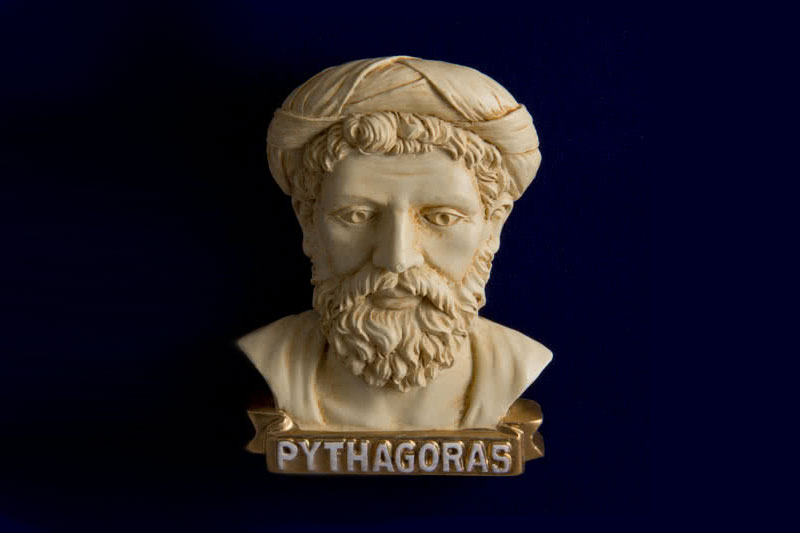
Pythagoras was the greatest mind of all time according to modern day thinkers. He was a mathematician who pioneered mathematic in the western world. He is remembered today as the creator of the Pythagorean theorem.
Pythagoras was born on the island of Samos around 570 B.C. He was not only a mathematician, but a miracle worker and philosopher.
Apart from his Pythagorean theorem, he had two major discoveries or teachings to his name.
The first was that if you wanted to understand the way the universe worked, that it could be learnt through the study of numbers.
The second was that your soul does not pass on to the underworld when you die, but that it passes into a new bodily form.
Pythagoras, while a very smart man, was a very superstitious man. If he were alive today and said the things he did back then, he would be considered eccentric at best, a nut at worst.
Pythagoras died in 500 B.C. His followers after his death, split into two separate groups. One of those groups was the leading force in ancient astronomy. It was this group that made the claim that the earth was spherical, not flat as many thought
Homer
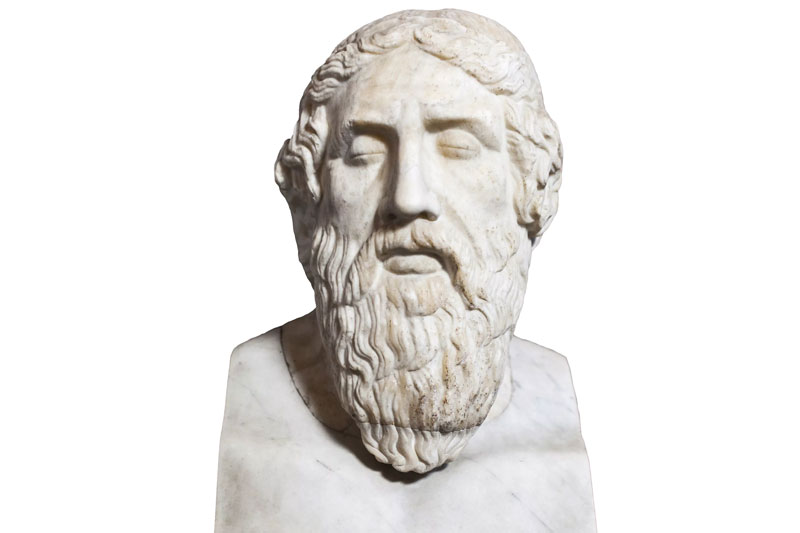
Homer was the most famous of all Greek writers and poets. His two most famous works were the Iliad and the Odyssey.
Nothing is really known about Homer or his life. Most of what we know has been passed down from the generations. There was no autobiographical information in his works. Many believe that there may have been more then one Homer.
Homer may have been a pen name for a group of people who wrote in the same style. No one is exactly sure where Homer was born or where he wrote his works from, if indeed it was just one person writing.
Alexander The Great was said to have slept with a copy of the Iliad under his pillow.
The Iliad and the way Homer depicted the battle for Troy, especially Achilles inspired Alexander to greatness.
Isocrates
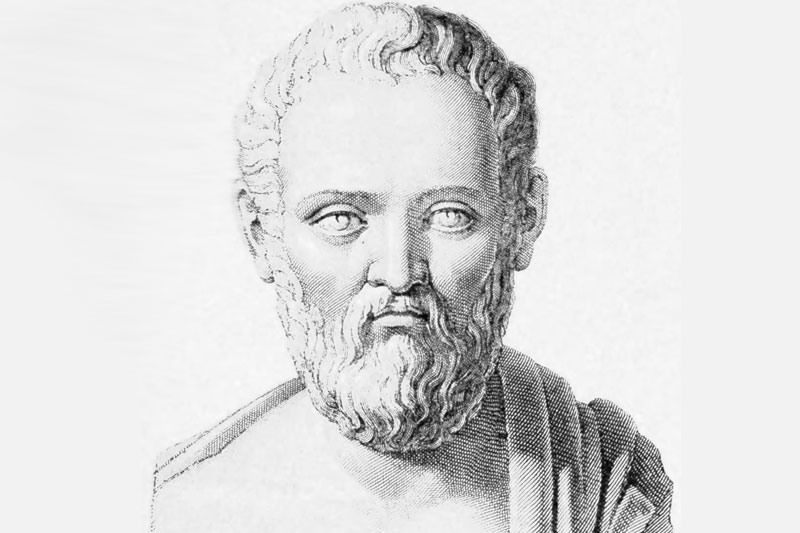
Isocrates was a very influential Athenian orator. His major claim to fame was his rallying cries for the Greeks to unite in a crusade against the great Persian empire.
Isocrates lived between 436 B.C. to 338 B.C. Isocrates lived to be a very old and respected man in mainland Greece.
His most famous writing was to King Phillip II, king of Macedon and father of Alexander the Great. In this open letter he called on Phillip to raise an army and unite with the Greeks to conquer all of Persia.
Unfortunately, Phillip had ideas of conquering Greece, which he did.
Isocrates came from a very wealthy family, and lived a fairly easy life.
Isocrates, at 98 years of age, starved himself to death in protest of King Phillips conquering of mainland Greece.
Euripides
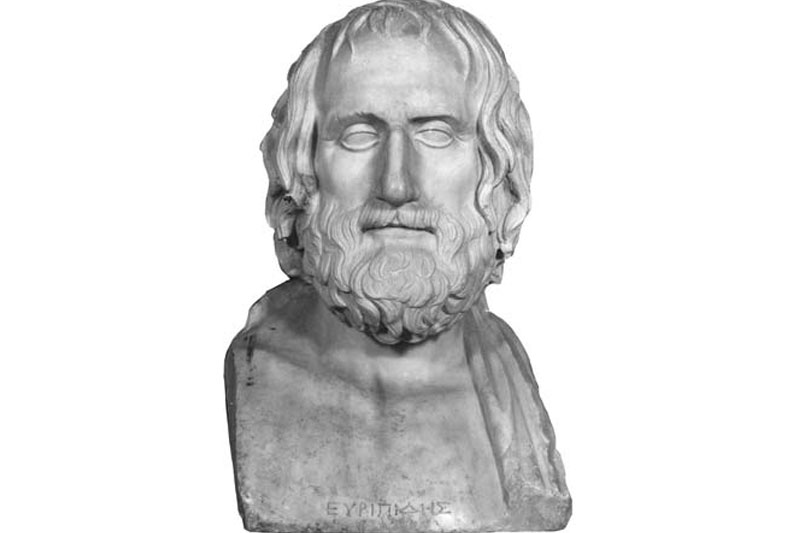
One of the three great Athenian tragedians, Euripides introduced his audience to the depths of the human psyche including madness and obsessive love. He sparked controversy by questioning religious ideas and for his use of female protagonists in his myths.
Having written over 90 plays, over 80 of which are still known today, makes him the most prolific Athenian playwright of any era.
Little is known about the life of Euripides, apart from the fact he came from a fairly wealthy family from Phyle which is just outside the Athenian borders. What is known for fact is that Euripides was a reclusive man, who wrote his best works while writing in a cave on the island of Salamis.
He was married twice and died in his early to mid 80’s in 406 B.C.
Ancient Greece Greatest Leaders
Alexander The Great
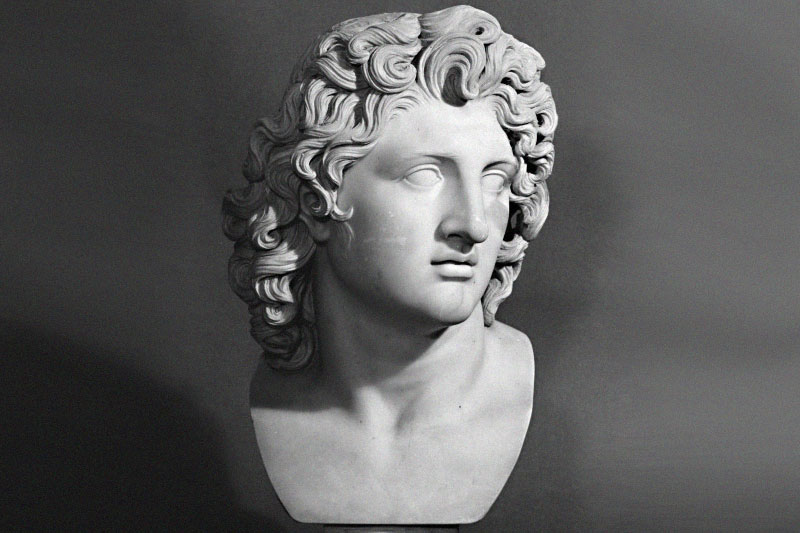
Alexander The Great was Macedonian king and lived from 356bc to 332bc. Alexander was considered the finest battlefield commander of all time.
By the time of his death on his 33rd birthday, he had created the largest kingdom the world had ever seen, stretching considerable over 3000 miles.
Countless books have been written about Alexander The Great and he has been revived into almost a cult status with the latest versions of his life being portrayed in movies.
Alexander was crowned king of Macedon at the ripe age of 20 after his father King Philip II was murdered by an assassin’s knife in 336bc.
While Alexander is credited as being one of the greatest military leaders of all time, he inherited a great army that his father had created from scratch, especially the Cavalry and his heavy infantry.
Alexander as a man had serious flaws. He was a reckless drinker, had a very short temper, which became violent at the drop of a hat and he never, planned his succession.
His empire was the largest the world had ever seen at the time and stretched as far as the known world as they knew it.
In 323bc, on the 10th of June, Alexander died, after 10 days of being fiercely sick. The story was that he was poisoned by Antipaters son Cassander, which was probably false. He more then likely died of a disease he caught from his travels and died of fever.
Pericles

Pericles was the greatest statesmen Athens ever produced. He lived Circa 495 B.C. to 429 B.C. He was the man who was said to have turned Athens into the greatest city of its day.
Pericles political views were leftist to the extreme and while he came from a noble and rich family, he had the wide support of the people. The lower and middle come citizens of Athens.
As Athens was a democracy, Pericles never held the title of president or ruler, but of military general. Every year, 10 men were elected as military generals of Athens. Pericles served for 20 years without interruption, which was unheard of, such was his popularity.
He was the father of democracy in Athens and shaped the way the city state was to be run for hundreds of years after his death. He did however make one mistake. During the Peloponnesian war, he made the fatal mistake of going on the defensive. He told the people living outside the city wall, those who owned the farms to move into the city walls for safety, thinking it was unbreakable.
The Spartans ravaged the country side and famine and plague took over Athens. Thousands died, including Pericles only after being ridiculed and fined for his decision to wall themselves up.
Prominent city-state in Ancient Greece
Athens
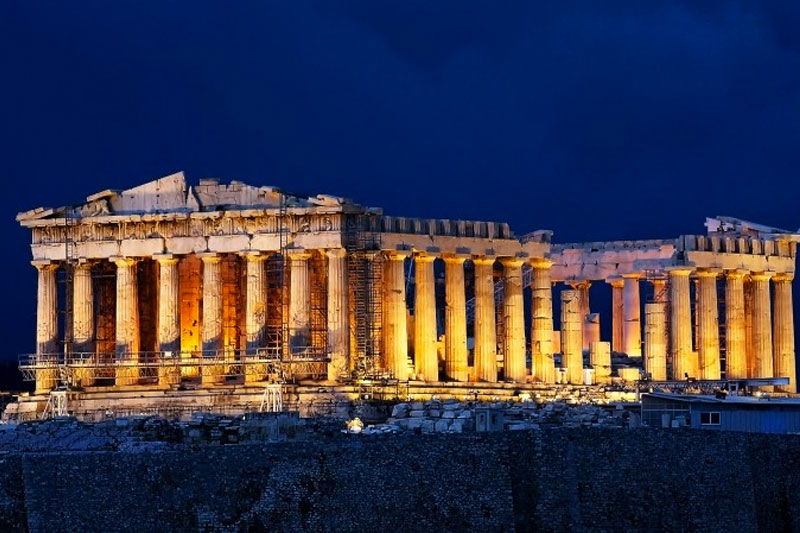
Athens along with Rome and Jerusalem was one of the three most important ancient cities that shaped Western civilization, and was the foremost city of ancient Greece.
Athens provides a cornerstone of our modern society due to the culture that was produced by the rich and confident Athens of the mid 400s B.C in, Architecture, Sculpture,Theater and Philosophy, and was the birthplace of Democracy “power by the people”. Located in southeast-central Greece, in the peninsular land-mass called Attica, Athens lies amid the regions largest plain, where olives and grain were grown in historical times. The 300 foot tall rock formed hill later known as the Acropolis was the sites foremost attraction. This defensible position and being four miles inland of the Saronic Gulf, gave access to the sea without inviting naval attack.
Acropolis – upper city
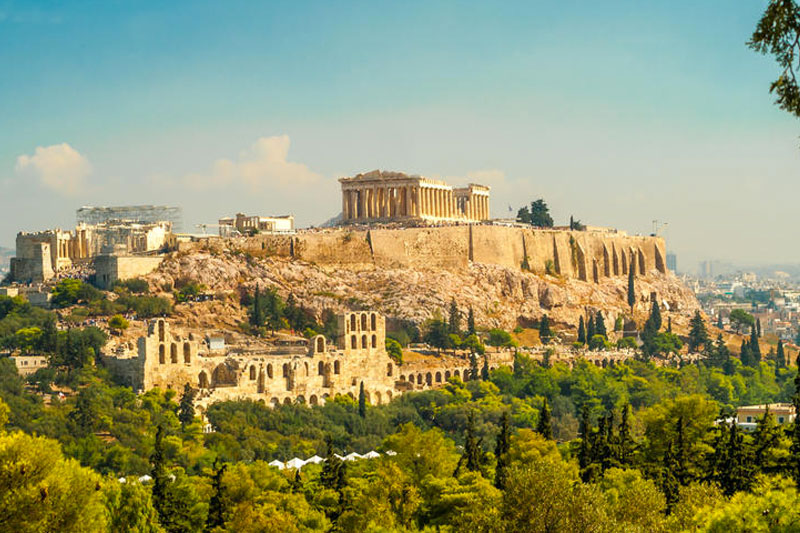
Acropolis in ancient Greek meant the “upper city”. This was a vital feature of most ancient Greek cities of the time. It provided an area that was elevated above the rest of the city, which was good to repel attacks and to perform religious ceremonies.
Of course, the best know Acropolis is at Athens, which still stands to this day. This was built some where in the 400bc.
The Athenian Acropolis contains the remains of the famous Parthenon, the temple of the Virgin Athena, whom Athens takes its name.
Sparta
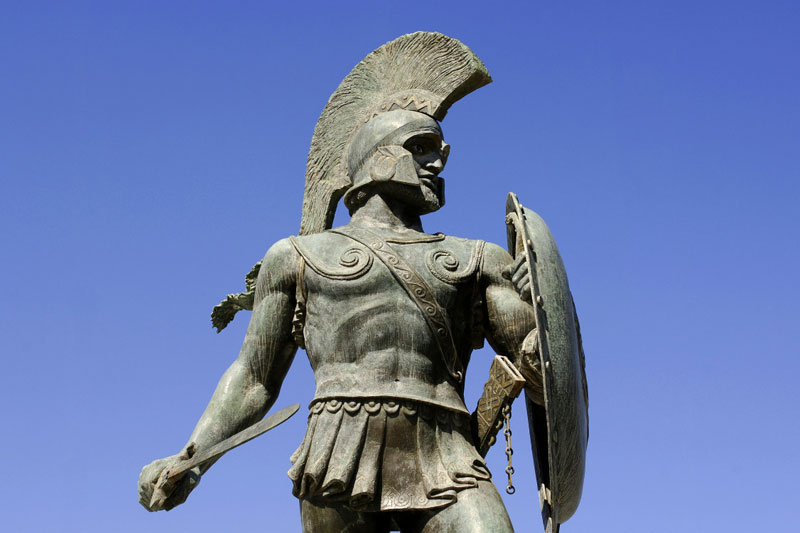
Sparta was the most war like and militaristic city states in all of Greece. Always a powerful force in ancient Greek times. It’s main rival was Athens.
Unlike Athens, Sparta was not a democracy, but an Oligarchy which means “rule by the few”.
Sparta was the most dominant Greek city after 600 B.C. But everything was not rosey in Sparta.
The Spartans were a secretive group, they let few visitors into their city and left behind very few writings. They were not thought of as very intellectual as most of the emphasis was placed on military service.
Every able man from birth was enlisted into the Spartan army for life. Sparta has the most fierce military in the world until King Phillip II of Macedon and his son Alexander the Great rose to power.
The Spartans unlike their Athenian counterparts, did not build great monuments and they shunned shows of wealth. They left behind no statues or writing, and their temple was nothing more then a stone hut covered in bronze.
Sparta’s ultimate destruction came at the hands of the mighty Roman empire.

